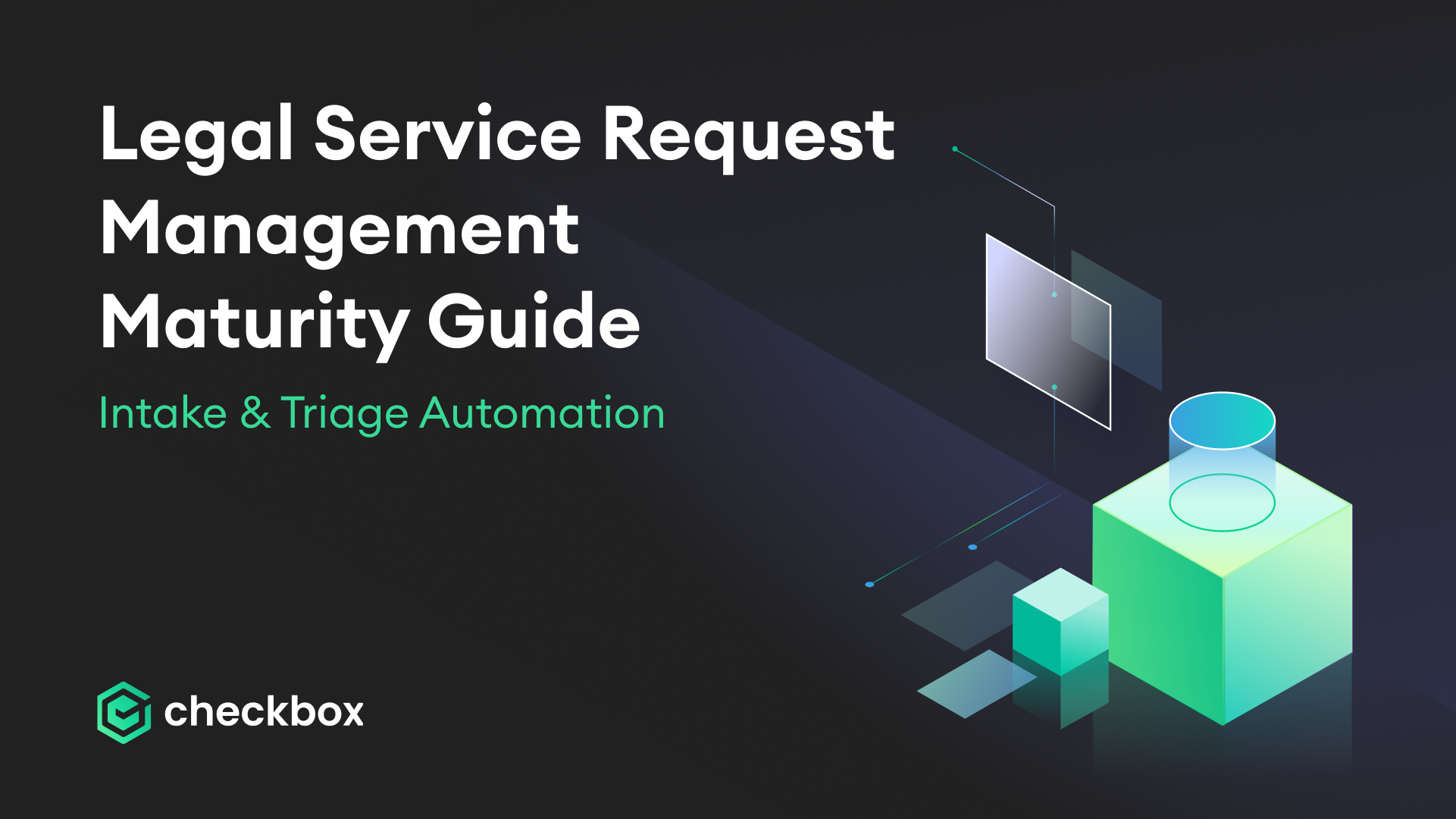
Sign up to our newsletter
Get insightful automation articles, view upcoming webinars and stay up-to-date with Checkbox
Reading time:
[reading time]

From ChatGPT to Microsoft Copilot, companies everywhere are finding new ways to use AI to speed up work and cut costs. But for legal teams, the AI boom looks very different.
The same tools that make life easier for marketing or HR can create major risks when applied to legal work. When legal advice, client data, or internal policies are entered into public AI tools, teams lose control over how that information is handled, stored, or interpreted.
That doesn’t mean legal should avoid AI altogether. It means legal needs AI that’s built for legal.
A purpose-built AI agent is designed around the realities of legal operations, helping teams manage requests, triage matters, automate routine work, and surface insights securely and accurately. It understands legal context, applies governance controls, and conveniently fits into how legal teams already work.
That’s why more legal departments are turning to legal-specific AI agents like Checkbox that combine the intelligence of modern AI with the privacy, structure, and reliability legal teams depend on every day.
Why Legal Teams Can’t Rely on ChatGPT
There’s a reason ChatGPT has become a household name. It’s fast, accessible, and often surprisingly good at what it does. Ask it to summarize a document, draft an email, or explain a complex topic, and it’ll give you a solid starting point in seconds. However, legal doesn’t have that luxury.
Technically, you can upload company playbooks, templates, or internal guidance into general AI platforms. Many teams already do. But the problem is that those systems weren’t designed to handle that kind of data responsibly in a legal context. They lack the built-in guardrails, governance, and visibility that legal teams require.
For example:
- Limited control over data use: Once information is uploaded, legal teams can’t always see or manage how it’s stored, shared, or deleted.
- No formal compliance oversight: These tools don’t operate under the same privacy, audit, or data retention standards legal departments must uphold.
- No matter management connection: General AI exists in isolation, meaning it can’t feed insights back into legal workflows or track how information is used.
- Risk of overconfidence: ChatGPT can produce answers that sound authoritative but aren’t based on verified legal logic or company policy.
The truth is, ChatGPT is designed for breadth, not depth. It’s a generalist, which is exactly what makes it powerful for some teams, and problematic for others. Legal work demands a level of context, consistency, and control that general-purpose AI simply wasn’t built to provide.
That’s why more and more legal teams are turning to purpose-built AI agents: systems trained and deployed within the legal function itself. These tools use the same powerful AI technology but are designed around legal’s core priorities such as privacy, precision, and process integrity.
Why Legal Needs Purpose-Built AI Agents
Today’s legal teams are starting to look beyond general-purpose AI tools like ChatGPT and toward purpose-built AI agents designed specifically for legal operations.
A purpose-built AI agent connects directly to the systems, templates, and processes that define how legal work happens within an organization. It understands what a “matter” is, how “approvals” work, and why protecting sensitive information is non-negotiable.

Legal AI agents are designed around a few core principles:
- Context matters: It draws from your team’s approved knowledge base (i.e. policies, playbooks, templates) ensuring that guidance aligns with your standards.
- Governance is built in: Every interaction happens in a controlled environment with clear permissions, audit trails, and security policies.
- It fits the workflow: Instead of being a standalone chatbot, it plugs into intake, triage, document automation, and matter management.
- It scales safely: You can automate without exposing sensitive data or creating compliance blind spots.
Related Article: Learn more about the benefits of AI for legal professionals.
ChatGPT vs. Purpose-Built Legal AI: Key Differences
At a glance, ChatGPT and purpose-built legal AI tools can look similar. Both use advanced language models. Both can analyze text, draft responses, and provide quick answers. But the similarities end there.
The real difference lies in who they’re built for. ChatGPT is designed for anyone: students, marketers, engineers, lawyers, you name it. Purpose-built legal AI, on the other hand, is designed specifically for helping legal teams manage their work securely, accurately, and efficiently.
Here’s how that difference shows up in practice:
| Category | General AI (ChatGPT) | Purpose-Built Legal AI (Checkbox) |
|---|---|---|
| Intended Use | Built for general productivity and conversation | Built specifically for legal operations and workflows |
| Context & Accuracy | Provides general answers that may lack legal or organizational context | Draws from your legal team’s own templates, playbooks, and policies |
| Compliance & Governance | No built-in controls for audit, approval, or regulatory oversight | Designed with compliance, permissions, and audit trails in place |
| Integration | Operates as a standalone chatbot | Legal chatbot is embedded in legal workflows like intake, triage, and matter management |
| Risk Profile | Suitable for low-stakes, creative, or exploratory use | Safe for sensitive, high-stakes, and regulated work |
💡Pro Tip: Purpose-built legal AI delivers the same intelligence and speed as general-purpose AI tools but applies them within a governed, auditable, and secure framework. One that aligns with how legal teams already operate.
How Purpose-Built AI Agents Fit Into the Legal Tech Stack
The best technology for legal doesn’t live in isolation. It works within the systems, workflows, and processes that teams already use to manage their day-to-day work.
Instead of sitting outside your legal ecosystem, a purpose-built AI agent connects directly to where legal work happens, from intake to triage to reporting. It acts as a layer of intelligence built into your existing workflows.
Take Checkbox, for example. Its AI agent supports legal teams at every stage of their work:
- AI Intake and Triage helps business users submit requests in plain language, automatically routing them to the right process or lawyer.
- AI Legal Assistant provides instant, reliable answers drawn from your team’s approved policies, playbooks, and templates.
- AI Term Extraction identifies key details in contracts or documents, improving visibility and reporting without manual review.
- AI Matter Summary automatically summarizes matter history, key details, and communications so legal teams can quickly get up to speed without reading through long email threads or records.

Together, these tools help legal teams move faster, stay organized, and operate with more control, without compromising security. By embedding AI into intake forms, approval chains, and dashboards, intelligent in-house legal software like Checkbox make AI a seamless part of how legal delivers value to the business.
How Legal-Specific AI Delivers Measurable Impact
For most legal teams, the question isn’t whether to use AI, it’s how to do it safely and effectively. Legal-specific AI helps legal teams work faster, with fewer risks, and with clear proof of impact. Here’s what that looks like across the business:
For General Counsels
Legal leaders gain greater visibility into team workload and performance without sacrificing confidentiality. Purpose-built AI agents surface insights that help GCs allocate resources, report on legal value, and make data-driven decisions, all while keeping sensitive information secure.

For Legal Operations
Legal Ops teams can automate routine intake, approvals, and reporting, reducing manual effort and cutting turnaround times. They get the governance and auditability missing from generic AI tools, which means fewer compliance gaps and smoother collaboration with the business.

For IT and Security
Purpose-built AI tools align with enterprise data governance and security frameworks. They offer predictable, compliant data handling and reduce the risks of employees experimenting with unsanctioned AI tools.
The Future of AI for Legal Teams
Since general-purpose tools like ChatGPT lack the guardrails, governance, and integration legal work requires, the future of AI in legal won’t be about open chatbots. It’ll be about purpose-built agents that understand the function, the workflows, and the responsibility that come with them.
Platforms like Checkbox are leading that shift. By embedding AI directly into intake, matter management, and reporting, Checkbox gives legal teams the same intelligence and speed as general AI, but with the control, accuracy, and compliance that enterprise work demands.
AI can help legal teams move faster. But only purpose-built AI ensures they move smarter, safer, and with confidence.
Ready to see how Checkbox’s purpose-built AI agent can transform your legal team? Book a demo to see it in action.
Frequently Asked Questions
How do purpose-built legal AI agents differ from general ChatGPT-style tools?
Purpose-built legal AI agents are designed for secure, compliant legal workflows, drawing from approved templates and playbooks. ChatGPT-style tools are general-purpose, lack governance features, and aren’t suited for handling confidential legal data.
What compliance and ethics checks should a legal AI agent include?
A legal AI agent should meet enterprise standards like SOC 2 and ISO 27001, support audit trails, and ensure data residency compliance. It should also align with internal legal ethics policies on confidentiality and client data protection.
What integrations matter most for a legal AI agent?
Key integrations include practice management systems (PMS), document management systems (DMS), e-billing tools, and workflow platforms. These connections allow AI to streamline end-to-end matter management while maintaining a single source of truth.
Is ChatGPT safe for legal teams to use?
ChatGPT is useful for general productivity but risky for handling legal or confidential information. Legal teams need AI tools with built-in governance, data security, and auditability.

Checkbox's team comprises of passionate and creative individuals who prioritize quality work. With a strong focus on learning, we drive impactful innovations in the field of no-code.
Book a Demo
See the New Era of Intake, Ticketing and Reporting in Action.

.svg)


